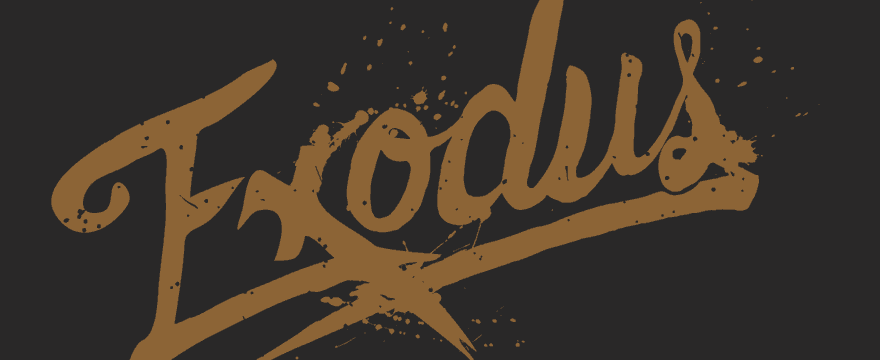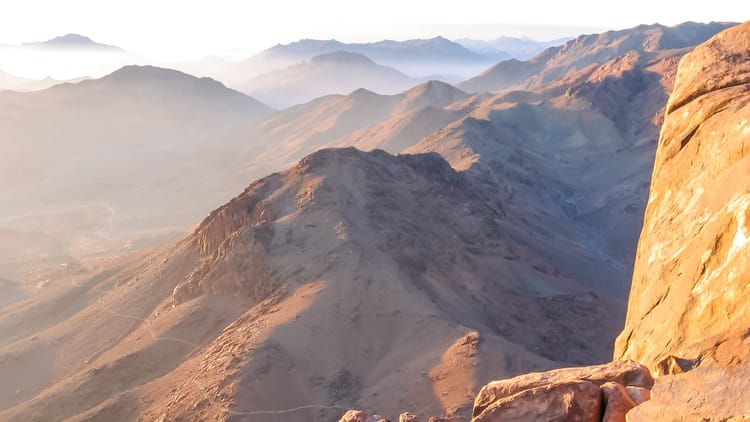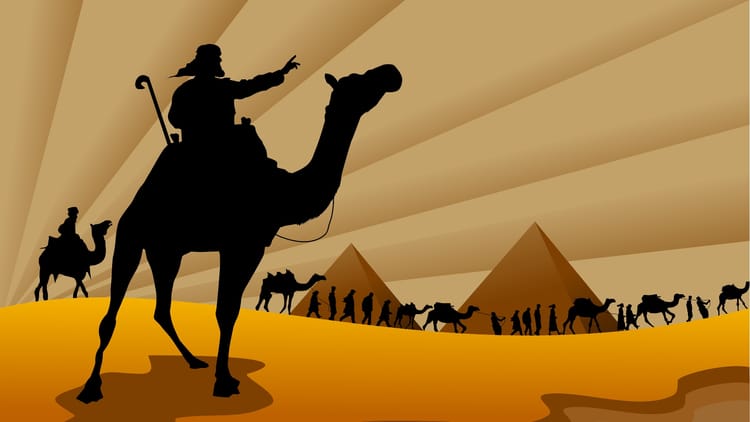Why We Wander (Exodus 32:1-33:6)

Big Idea: Under stress, we return to “gods” we used to trust. Our only hope is our mediator.
I couldn’t understand it. He was a man that I respected, and he had been greatly used by God. It’s why I was shocked when I heard what he had done. In an unguarded moment, he had tarnished his reputation and brought dishonor to God. He unraveled years of faithfulness, lost his reputation, and paid the consequences in his personal life.
Who am I talking about? I wish I were just talking about one person! I still remember the first time it happened, but it’s happened many times since then. I used to think that it was bad people who had affairs, embezzled money, or abused alcohol and drugs. I know better now. We’re all capable of falling flat on our faces. And today’s passage is going to help us understand why and what we can do about it.
Let’s look today at the passage we just read, because it’s going to give us an insight into our makeup. It’s going to not only tell us about a danger that all of us face, but it’s also going to show us what we can do about it.
Let’s begin by looking at when we’re in danger.
What would cause someone to fall flat on their faces? What would cause someone to compromise everything that they stood for and lose their reputation?
In Exodus 32, we read:
When the people saw that Moses delayed to come down from the mountain, the people gathered themselves together to Aaron and said to him, “Up, make us gods who shall go before us. As for this Moses, the man who brought us up out of the land of Egypt, we do not know what has become of him.”
This is so fascinating. If you understand what happens here, you’ll begin to understand why we’re so prone to go astray.
The nation of Israel has seen God move. God has taken them from being a nation under slavery to a free nation on the way to a land that God had promised them. God had told them that they would be his treasured possession, and that he would live among them. This was amazing. He had provided for them miraculously in the desert. They had seen God move with their eyes, and had heard his voice with their ears. They’d just heard God make a covenant with them.
However, they had a problem.
We read in verse 1 that Moses was delayed in coming down from the mountain. Big deal, right? It actually was a big deal. From their perspective, Moses had been gone much longer than they’d expected. They were people with families. They were standing in the middle of the desert with no homes and no jobs. God had given them manna and quail, but that’s only as good as it lasts. At any moment, as far as they knew, that could end, and they would be stuck in the middle of the desert with nothing.
They felt exposed, vulnerable, and scared. And Moses was their only connection with God, and who knew if he was even still alive or if he would ever come back?
And so their solution was, “Make us gods who will go before us.”
This is not just a picture of the ancient Israelites. This is a picture for us too. The apostle Paul wrote to a church in Corinth and said:
Now these things took place as examples for us, that we might not desire evil as they did. Do not be idolaters as some of them were; as it is written, “The people sat down to eat and drink and rose up to play.” (1 Corinthians 10:6-7)
Paul says that we face the same danger that they did. We could make idols. At first glance, that seems crazy. I don’t think anyone here has an idol in their house. We’re not about to create a golden calf or anything like that. What does Paul mean that we face the same danger that Israel did back then?
Let me make a prediction. You are going to go through times in your life in which you feel exposed, vulnerable, and scared. Did I say that’s a prediction? I think I should call it a guarantee. This is the ordinary human experience. You will face tough times in life when you will seek something to provide you with assurance and comfort.
In those trials, God will sometimes seem distant. How do I know this? Because that’s also the ordinary human experience. We live in the already but not-yet period. God has given us eternal life, but we don’t have the complete fulfillment of these promises yet. We believe they’re true, but we walk by faith, not by sight. And sometimes when we’re in the middle of troubles, God will seem distant. We will seek comfort and assurance and might question God's presence when it's not as clear as we expect.
In those times, we’ll grab on to something for assurance and comfort, and if it’s not God it will be something else. Under stress, we return to “gods” we used to trust.
This is actually the original sin, and it’s the sin that we’re tempted to repeat every single day. Think about it. Just like in the Garden, God is temporarily absent. Just like in the Garden, the people doubt God’s goodness and his word. They’re afraid, and so they cling to something familiar in the place of God. For Adam and Eve, it was the tree. For Israel, it was the golden calf. For us, it will be something else.
This isn’t the world. This is God’s people. We’re going to be struggling with this temptation for the rest of our lives, and it’s the same as the first temptation faced by Adam and Eve.
“All of you, before you were saved (before you knew God) had sinful patterns in your lives; idolatries: things you trusted in, things you sought after, things that gave your life meaning, more than God did” (J.D. Greear). And when we’re scared or under stress, we tend to return to these old idolatries and worship them beside God. Notice, by the way, that these people didn’t think they had stopped worshiping God. In verse 5 they worshiped the golden calf even as they held a feast for the Lord. We cling to our old idols as well as God. We look to them for comfort and strength.
I started this sermon by expressing my confusion about why people I respect abandon everything and revert to their old habits. Well, actually, I do understand it. This story tells us what happened. They faced some pressure, and they looked to something other than God as a way to deal with that pressure or fear.
So let me ask you the question before we go on: where do you turn for comfort and strength when you feel scared? What do you tend to trust in alongside of God? You, like all of us, will be tempted to think, “I need God, but I also need that to be okay.” What is that? Some of us bury ourselves in work. Some of us look to relationships to feel that we’re okay. Some of us look to our bank account or something that preserves our status or reputation. Some of us turn to drugs, alcohol, or pornography.
Do you want to know what your idol is? Think about what you love to daydream about. Think about where you spend your money. Think about the places you turn when you’re under great stress. Think about what you can’t imagine losing because you don’t know how you’d go on. Think about what sparks uncontrollable emotions in your life — anger, fear, or passion.
The Heidelberg Catechism says: “Idolatry is having or inventing something in which to put our trust instead of, or in addition to, the only true God, who has revealed himself in his Word.” We’re all in danger of idolatry without even knowing it. Under stress, we return to “gods” we used to trust. This is the universal human condition.
Let’s look, then, at why this is such a big deal.
We won’t spend a lot of time here, except to notice that this is a very big deal. In verse 7, God tells Moses to go down. He threatens to wipe out the entire nation and to start again with Moses. In verse 19, Moses takes the tablets containing the law and smashes them. The law represents the terms of God’s covenant with the people. Moses is communicating that everything is in danger. This act could unravel everything. It’s endangering their very relationship with God.
The reason why this is such a big deal is this: when we serve other gods, we are setting our whole hearts on something other than God. Something has taken God’s place in our lives. This isn’t a little sin. This will endanger our entire spiritual lives. It’s a matter of serious concern for all of us.
Don’t forget the examples of the people I mentioned at the beginning of the sermon. They faced catastrophic consequences for trusting in other “gods” when under stress. It’s a serious danger for all of us.
What, then, should we do?
There’s a two-part answer to what we should do, but I’m only going to look at the first today. We’re going to spend the whole of next week — our last sermon in this series — on one of the things we need to do to deal with this danger. So you really need to come back next week.
But today let’s look at the partial answer. Our only hope is a mediator.
You see, God tells Moses that he wants to wipe the people out. “Now therefore let me alone, that my wrath may burn hot against them and I may consume them, in order that I may make a great nation of you,” he says (Exodus 32:10). Sometimes people wonder why God judges sin at all. People criticize God because he takes sin so seriously. I have the opposite reaction. I can’t believe that God is so patient. When you consider how holy God is, and how often we rebel against him, it’s amazing that his patience has endured so long.
Why didn’t God wipe Israel out? Moses mediated for them.
O Lord, why does your wrath burn hot against your people, whom you have brought out of the land of Egypt with great power and with a mighty hand? Why should the Egyptians say, ‘With evil intent did he bring them out, to kill them in the mountains and to consume them from the face of the earth’? Turn from your burning anger and relent from this disaster against your people. Remember Abraham, Isaac, and Israel, your servants, to whom you swore by your own self, and said to them, ‘I will multiply your offspring as the stars of heaven, and all this land that I have promised I will give to your offspring, and they shall inherit it forever.’ ” And the Lord relented from the disaster that he had spoken of bringing on his people. (Exodus 32:11–14)
Moses pleads with God. His arguments are simple:
- God, remember your reputation.
- God, remember your covenant.
He pleads with God based on his reputation and covenant to preserve the people, and God answers his prayer — which leads to centuries more of the same thing, rebellion after rebellion. Friends, God is so patient. What has kept him from wiping us all out? Not our innate goodness. We have a pretty poor track record. What has kept God from wiping us all out is a commitment to his reputation and the covenant that he has made to us.
We need a mediator. And we have that mediator, an even better one than they had. We have a mediator named Jesus. 1 Timothy 2:5 says, “For there is one God, and there is one mediator between God and men, the man Christ Jesus.”
He’s an even better mediator than Moses. Moses only prayed. Jesus not only prayed, but he actually died for us. “His name was blotted from the book of the living, he died that we might live” (Spurgeon). He didn’t just ask God to make atonement; he made atonement at the cost of his own life. “This being the case, nothing ought to prevent any sinner from pleading for himself through Jesus Christ” (Spurgeon). In a sense, Exodus 32:14 is written over the head of every Christian: “And the LORD relented from the disaster that he had spoken of bringing on his people.”
What does this mediator do? He intercedes for his people. Hebrews 7:25 says, “he is able to save to the uttermost those who draw near to God through him, since he always lives to make intercession for them.” Right now he is praying for us. He not only pleads what he’s done for us, having paid the penalty for our sins, but he’s making specific requests to God on our behalf. One theologian writes:
It is a consoling thought that Christ is praying for us, even when we are negligent in our prayer life; that He is presenting to the Father those spiritual needs which were not present to our minds and which we often neglect to include in our prayers; and that He prays for our protection against the dangers of which we are not even conscious, and against the enemies which threaten us, though we do not notice it. He is praying that our faith may not cease, and that we may come out victoriously in the end. (Berkhof)
It’s why Hebrews says that he’s able to save us to the uttermost. This means that he won’t leave the work of saving you half done. He will complete it — he will save all of you, every part of your life, for all eternity.
Under stress, we return to “gods” we used to trust. Our only hope is our mediator.
We began today by talking about people who’ve ruined their lives because they’ve turned to someone or something other than God in times of stress. We’re not that different, and it’s a big deal. It will destroy our lives. That’s what sin intends to do with us; it intends to destroy us.
Next week we’re going to look at something else that’s important in dealing with this. But today I want to leave you with this great news: you have a mediator who is praying for you right now.
Let’s pray.
When I fear my faith will fail
Christ will hold me fast
When the tempter would prevail
He will hold me fast
Thank you for this mediator who is holding us fast. May we all trust in him. In his name we pray. Amen.





